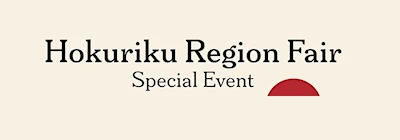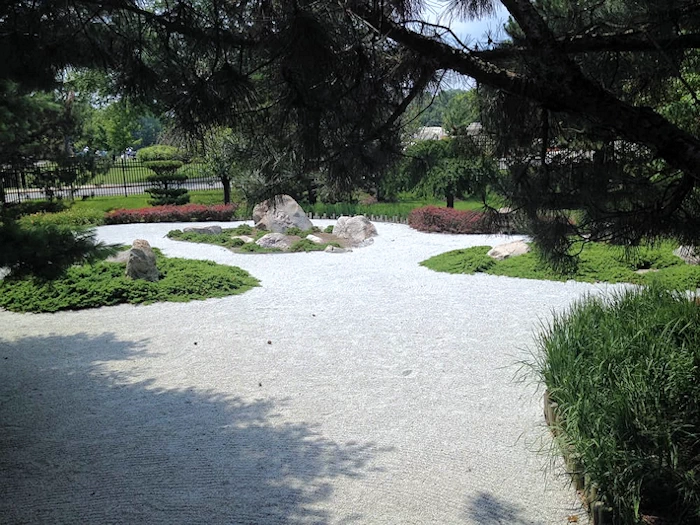Shiojiri Niwa, Japanese Garden
Event Location
438 N Niles Ave, Mishawaka, IN 46544, IN 438 N Niles Ave, Mishawaka, IN 46544
Location: 1000 East Mishawaka Avenue - Mishawaka Ave to the north, Indiana Avenue to the east, and Niles Avenue to the west, across from Merrifield Park. (map)
Features: A Japanese strolling garden that symbolizes the Sister-City relationship between Mishawaka, Indiana and Shiojiri City, Nagano Prefecture, Japan. It contains more than twenty different varieties of large plant material, over two hundred large boulders, donated statue and a teahouse pavilion. This is also a very popular summer wedding area.
The Japanese have taken their love of growing things and their realization of man’s union with nature and refined them in the beauty of their gardens. The purpose of a Japanese Garden is to present natural forms and to create a tranquil beauty that leads the visitor from everyday life to a calm, serene, reflective communion with nature.
Shiojiri Niwa is one of the few Japanese Style Gardens in Indiana. Dedicated in August 1987, it is Chisen-Kaiyushiki “A Strolling Garden” in which one is enticed from one point to the next by the constant unfolding of new scenes. It was designed by Shoji Kanaoka, Japanese Landscape Architect at Epcot Center, Disney World, Florida.
In Japanese Gardens, bridges are always made of natural materials, stone, wood, or earth. The Garden Bridge is a symbolic link between this world and paradise; the arch representing the difficult path to be followed. Bridges in Japanese Gardens carry people across water, whether real or simulated, as in Shiojiri Niwa. There is one zig-zag bridge in the Garden. According to legend, a person pursued by evil spirits can elude them by running across a zig-zag bridge. Because evil spirits only move in straight lines, they will fall into the water when the person changes direction. More practically, these bridges force you to watch your step, thus making you more aware of your surroundings.
The four small bridges are all uniquely different. The largest was inspired by the bridge leading to Matsumoto Castle not far from Shiojiri City. Its beautiful red finish adds a lovely contrast to the natural colors of the Garden. (Bridges, Teahouse Pavilion and entry gate designed by Phil Cartwright)
Rocks are an important feature in the Japanese Garden. They are almost always used in groupings of uneven numbers, three and often the sacred number five symbolizing the five universal elements; Earth, Water, Fire, Wind, and Sky. There are over 200 boulders in the Garden. Stone arranging can be linked to sculpting, and the skill of the Architect can be judged by his use of stone. In a Japanese Style Garden, rocks are often partially buried to look as though they have been there a very long time.
Water is symbolized in the dry garden where the gravel is raked into patterns representing the ocean waves. The gravel is not to be walked upon, which is logical if it symbolizes a body of water. The dry waterfalls symbolize mountain cascades. The cascade constructed with three levels of boulders symbolizes heaven, man, and earth, the three most important elements.
The Teahouse, sometimes with a nearby water basin for performing the ritual purification before entering, is an important area of the Garden for the drinking of tea, appreciation and contemplation. Because of its elevation, the Teahouse Pavilion is the perfect place from which to view all of the 1.3 acres of Shiojiri Niwa.
The Bronze sculpture of two American and two Japanese children was designed by Hidekazu Yokozawa and dedicated in 1992. It symbolizes the beginning of the special friendship between the two cities that started in 1964 when, under the direction of Hiroo Takasuna and Helen Amos, students from Nishi Primary School and Battell Elementary School first started exchanging letters, artwork, and gifts.
Age is highly respected in Japan, and trees are made to look older by pruning, shaping, and training. The pine is the tree most often used in Japanese Gardens. Shiojiri Niwa has five different varieties of pine. It symbolizes long life and, in a sense, eternity �' timelessness of nature. Along with pines, boulders form the skeleton of a Japanese Garden. Most of the plants in this garden are ones that grow well in the Mishawaka area and are appropriate to the feeling and appearance of a Japanese Garden. Japanese Style Gardens usually incorporate plants found in the surrounding landscape.
Please contact us if you have further questions by email or by phone: (574) 258-1664. You'll be transported to another world in Shiojiri Garden!
Contact
Phone: (574) 258-1664Location Website
(For Event Information See Event Website Page)
Authentic Japanese Gardens (United States)
Best Japanese Gardens
Japanese Rock 'Zen' Gardens (United States)
Best Japanese Rock 'Zen' Gardens
Japanese Teahouses (United States)
Best Japanese Teahouses
Japanese Museum Art
Japanese Museums Map of Japanese Museums

















